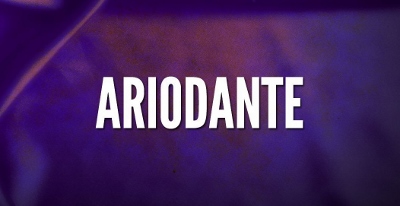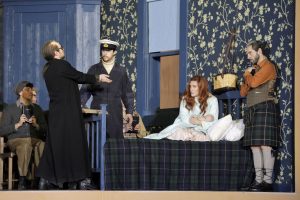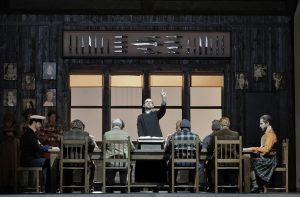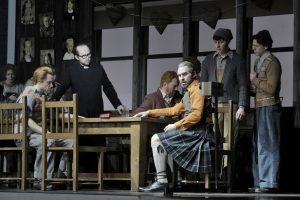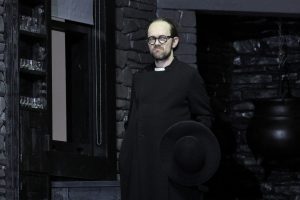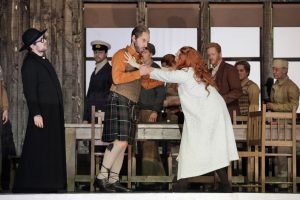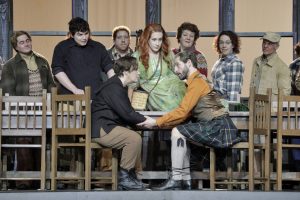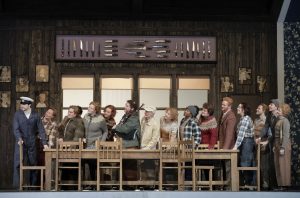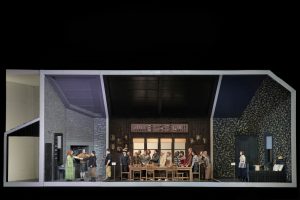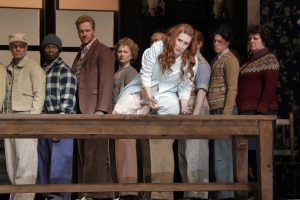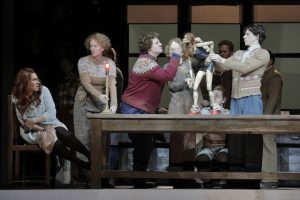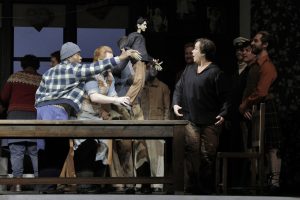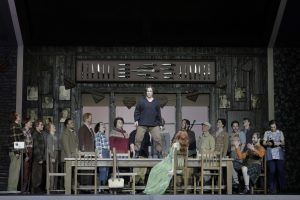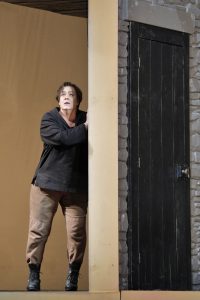HANDEL WITH CARE
It’s hard to believe that, following its Covent Garden debut in 1735, this glorious opera seria endured 191 years of neglect. It returned to the boards in 1926, even more so in the 1970s, selling its stuff with dazzling vocal pyrotechnics, courtly dances, and a hard-driving tale of innocence traduced and true love vindicated.
At three acts and almost four hours with two intermissions, Ariodante is a daunting tour de force, barely rewarding an audience’s passion to witness trusting sweethearts triumph over jealous and opportunistic intriguers who seek their sorrow. But, of course, the songs are Handelian: The Leipzig genius found the sound for so much feeling. His many forceful and filigreed notes reward both flawless technique and emotional inspiration.
To gauge how much this local premiere by Lyric Opera of Chicago — in conjunction with Festival d’Aix-en-Provence, the Dutch National Opera, and Canadian Opera Company — updates and alters Ariodante, return to the source. Handel’s inspiration, Ludovico Ariosto’s medieval romance Orlando Furioso, spun the chivalric chronicle of Ginevra, a falsely slandered Scottish princess and fiancée of Prince Ariodante. That knight’s wicked rival Polinesso, in cahoots with Ginevra’s lady-in-waiting Dalinda (who’s idiotically enamored of this wicked mountebank), easily manages to fool the hero into thinking Ginevra is unfaithful. (The cad reverts to the time-dishonored substitution ploy that the Bard uses in Othello and Much Ado About Nothing.)
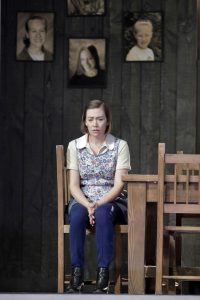 In no time the King of Scotland denounces his daughter and Ariodante contemplates — and imitates — suicide. Only a battle for Ginevra’s honor between the rogue Polinesso (who improbably defends the woman he disgraced) and Ariodante’s clueless brother Lurcanio can expose the treachery, destroy the perpetrator, and restore concord to these divided but never conquered lovers.
In no time the King of Scotland denounces his daughter and Ariodante contemplates — and imitates — suicide. Only a battle for Ginevra’s honor between the rogue Polinesso (who improbably defends the woman he disgraced) and Ariodante’s clueless brother Lurcanio can expose the treachery, destroy the perpetrator, and restore concord to these divided but never conquered lovers.
If the original work depicts noble personages in epic throes, Lyric’s radical 2014 revision by Richard Jones (here revived by Benjamin Davis) eradicates any Baroque escapist fantasies and ecstatic exoticism. It aims at the direct and even dour. The setting is a barren Scottish island in the early 1970s, populated by working-class fundamentalists mired in stern Calvinist cynicism. In this strictly scriptural world, a wife is no more than a “helper,” obedient to her keeper.
Bareboned in designer ULTZ’s spare set and thrift-shop costumes, their crude commune consists of wooden and flagstone quarters, the only object of adoration a trophy case of lethal knives. Here the opera’s original Terpsichorean interludes are replaced with Finn Caldwell’s puppets, manipulated by the parishioners into caricatures of, alternately, domestic bliss, female pulchritude and male pornography.
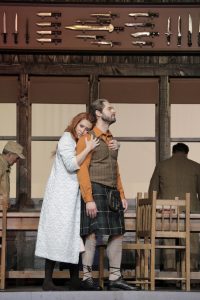 This sect seethes with a distrust of modernity, contempt for disco madness, and a reflexive suspicion of outsiders. The worst of these interlopers is snake-in-the-grass Polinesso, a false and hypocritical preacher who ensnares their credulity as he pursues Ginevra, daughter of the cult’s landlord.
This sect seethes with a distrust of modernity, contempt for disco madness, and a reflexive suspicion of outsiders. The worst of these interlopers is snake-in-the-grass Polinesso, a false and hypocritical preacher who ensnares their credulity as he pursues Ginevra, daughter of the cult’s landlord.
As in London 284 years ago, this fiend’s betrayal of unsullied virtue stinks to high heaven. But, festering beyond the third act’s punishment of venal evil, this Ariodante hues more to Ibsen than to Ariosto. Yes, Handel’s final joyous chorus remains intact, but by now a bitterly disillusioned Ginevra has suffered toxic distrust from people meant to cherish and protect her. Like Nora abandoning her “doll house” and hitch-hiking out these lowlands, she wants no part of the villagers’ misogynistic nightmare.
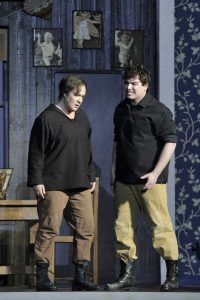 This melancholy modernization inevitably casts a bittersweet shade over Handel’s musical fireworks, however thrillingly sung by Brenda Rae’s gorgeous-toned Ginevra or the petulant counter-tenor from Iestyn Davies’ craven Polinesso. Replacing a flu-stricken Alice Coote on opening night, Julie Miller’s sweetly suitable Ariodante made much of her long laments and virtuosic ornamentation.
This melancholy modernization inevitably casts a bittersweet shade over Handel’s musical fireworks, however thrillingly sung by Brenda Rae’s gorgeous-toned Ginevra or the petulant counter-tenor from Iestyn Davies’ craven Polinesso. Replacing a flu-stricken Alice Coote on opening night, Julie Miller’s sweetly suitable Ariodante made much of her long laments and virtuosic ornamentation.
Heidi Stober brings timeless anguish to guilt-ridden Dalinda, Eric Ferring’s implacable Lurcanio morphs into a one-man vengeance machine, and Kyle Ketelsen, as the island king, is tearfully torn between devotion to a supposedly undutiful daughter and his disrupted community. Cryptically parading across this lackluster stage, the musically starved chorus bear witness more than shape the story.
Admittedly, an Ariodante that was utterly faithful to the opera’s formal pageantry and storybook make-believe would be problematic: In 2019, the all-forgiving 1735 finale feels like very hard happiness. Nonetheless, this drab, downer Handel is strong medicine, a harsh cure for the work’s acquired sexism. Jones’s version avenges Ginevra in ways that Ariosto never imagined.
But, impeccably intoned, Handel’s score is its own excuse for being and hearing. Still, seeing this Ariodante is a debatable decision.
Ariodante
Lyric Opera of Chicago
Civic Opera House, 20 N. Wacker Drive
ends on March 17, 2019
for tickets, call 312.827.5600 or visit Lyric Opera
for more shows, visit Theatre in Chicago
